If you're considering the purchase of a Tesla, it's important to be across unique aspects of EV ownership such as; servicing costs and costs of charging. Charging costs are not equl, in this article, we'll answer the most frequently asked questions about the cost of charging at Tesla charging stations at home and using the Tesla Supercharger network.
➡️TRY: Calculate Your Tesla Charging Costs
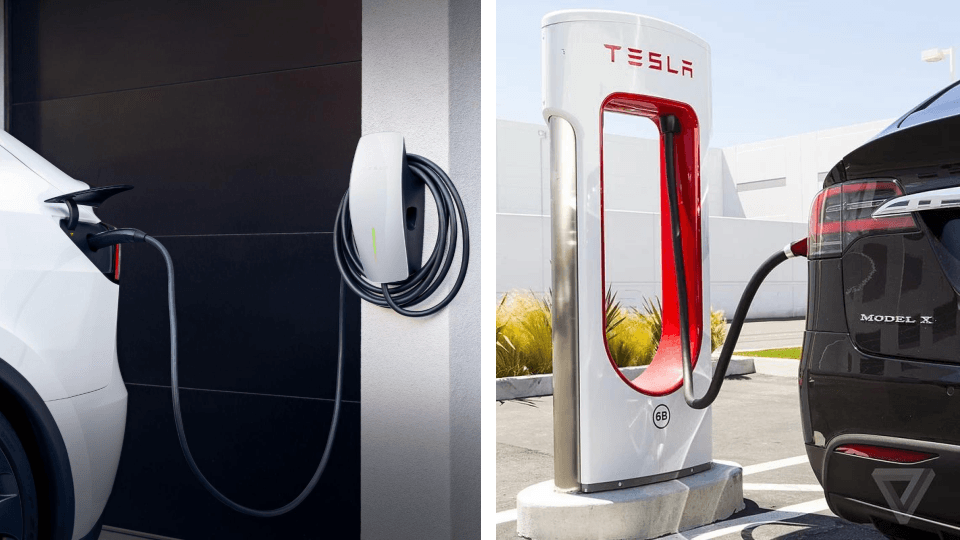
How Much Does it Cost to Charge a Tesla?
The cost of charging an Tesla depends on the model and the source (charging station used).
To illustrate the difference in cost, we've analysed the cost per 100km based on average prices you would typically from each source and each battery pack. We have chosen a Tesla Model Y RWD as the as the comparison vehicle as it easily the most popular electric vehicle on the road.
| Source | Rate |
| Supercharger* | $0.69 per kWh |
| Grid (flat tariff) | $0.30 per kWh |
| Solar (feed-in-tariff) | $0.05 per kWh |
*Tesla are increasingly implementing time-of-use/dynamic pricing at it sites to reflect a combination of cost of energy and availability of its supercharger stalls. The rates will vary by site but can range from anywhere between $0.30 at off-peak times to $0.90 at peak times.
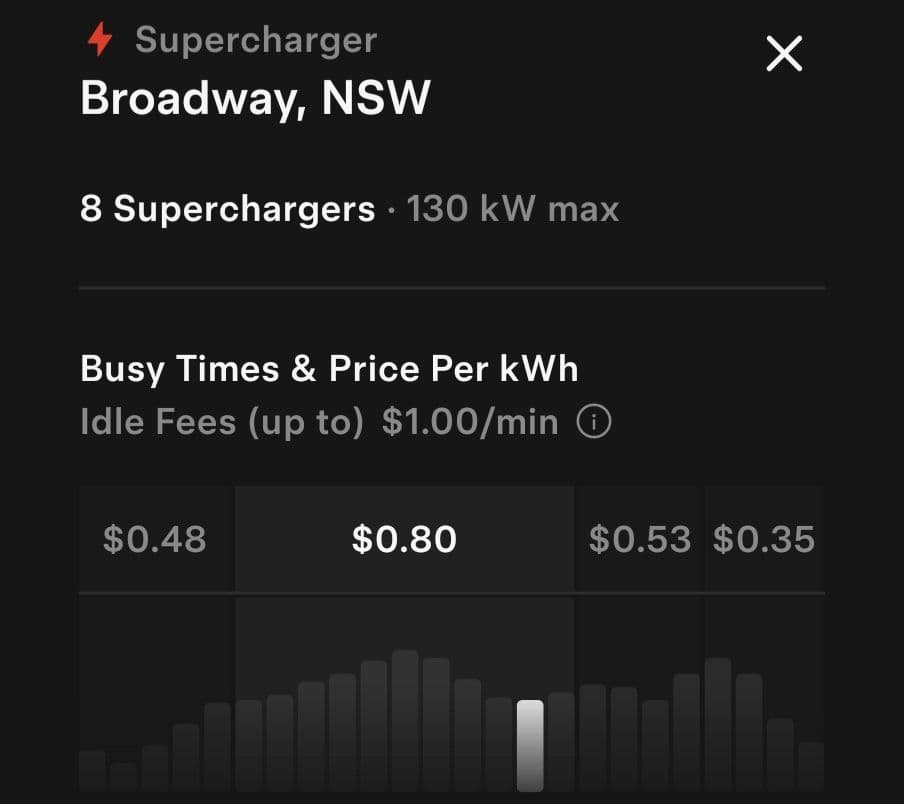
Compared to petrol options, charging a Tesla is substantially cheaper for the same distance covered. Compared to an equivalent petrol car, charging a Model Y will yield the following savings per 100 km:
- Supercharger network will yield a 50 per cent saving
- Charging at home is about 78 per cent cheaper
- Charging from your own solar system will save you 96 per cent.
Based on this example, the cost of charging a Tesla Model Y RWD costs between $0.60 and $8.20 per 100km, depending on where it is charged.
➡️MORE: Tesla Model 3 & Y Home Charging Guide
For a personalised calculation, use our charging calculator to determine the time and cost of charging your EV.
A few clarifications to note with regards to the above analysis:
- The range you get from a full battery in an electric car is generally less than a full tank in a petrol car. It is therefore not a like-for-like comparison.
- The best way to compare the cost of filling up a petrol car and fully charging an electric car is by comparing the cost of covering the same distance. In this case, we’ve used 100km as the measurement basis.
- Petrol prices generally operate within a given range irrespective of type or geography. Electricity prices on the other hand can vary significantly, depending on where the electricity is sourced (i.e. public fast chargers, the grid, solar).
How Much Does it Cost for to Fully Charge a Tesla?
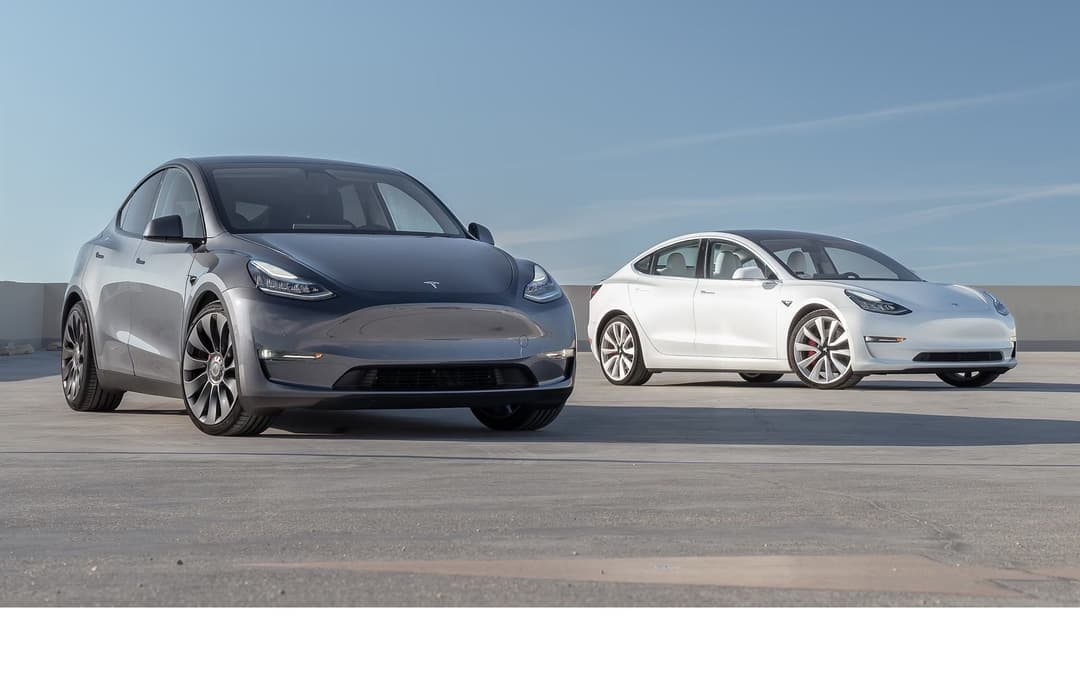
The cost to fully charge a Tesla will depend on the size of the battery and the electricity rate of the charging station being used. Tesla's come in two battery pack sizes:
1. 57.5 kWh for the Tesla Model 3 and Y RWD variants
2. 75 kWh for the Tesla Model 3 and Y Long Range and Performance variants.
As we mentioned earlier, on average, you can expect to pay between $0.43 and $0.69 per kWh at Tesla Supercharging stations.
Charging at a Tesla Supercharger Station is generally more expensive than other fast charging networks. The higher cost is attributable to the maintenance costs required to maintain Tesla's industry leading 99.95% uptime.
A Tesla Model 3 and Y RWD will cost between $16 (grid @ $0.30/kWh) to $37 (supercharger @ $0.69/kWh) to fully charge, providing between 450 km to 490 km of range.
A Tesla Model 3 and Y Long Range and Performance will cost between $21 (grid @ $0.30/kWh) and $49 (supercharger @ $0.69/kWh) to fully charge, providing between 514 km to 614 km of range.
As you can see, charging your Tesla from the grid (home/work) will be significantly cheaper, saving over 50% in charging costs. For the average driver this would result in savings of over $500 per year.
READ MORE
Tesla Charging Calculator: Time and Cost of Charging a Tesla
Work out the time and cost of charging a Tesla based on your personal circumstances.
➡️TRY: EV Charging Calculator
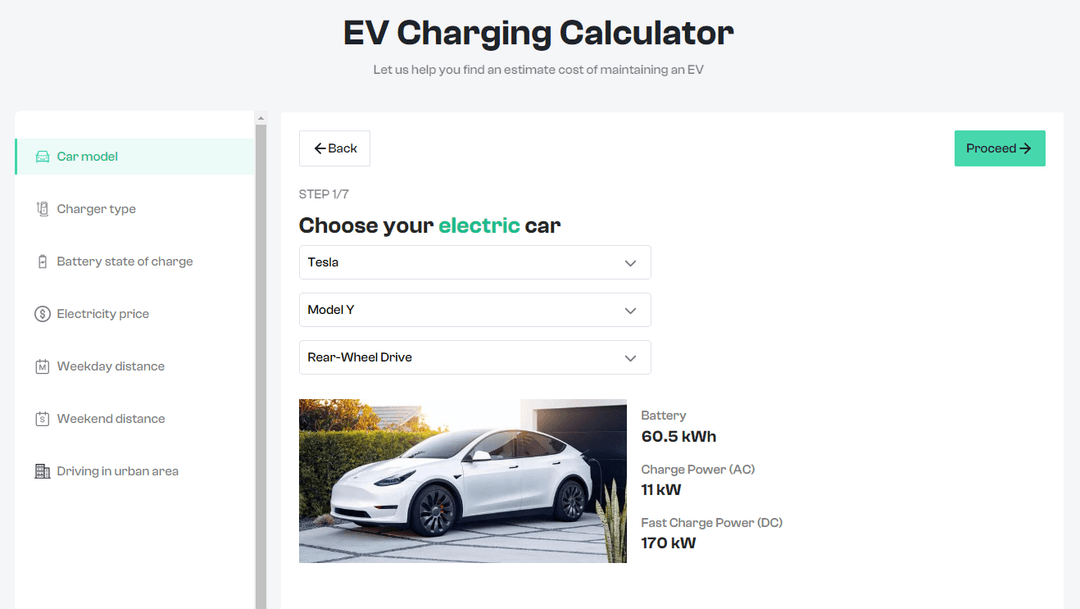
What Are the Annual Fuel Savings From owning a Tesla?
The annual fuel savings from going electric is directly correlated with the distance driven. On the above assumptions, the electric Tesla option (if charged from home) will yield a $14 saving for every 100km compared to the equivalent petrol vehicle. Essentially, the more you drive, the more you save.
In the chart below we’ve analysed the annual cost over distances ranging from a few thousand to seventy thousand kilometres per annum.
For example, the average Australian who drives 37km a day would save anywhere between $1465 to $2228 per annum, depending on how they charged their electric car.
Fuel savings step up substantially the more you drive. This does not include the savings from maintenance and service, which will also be substantial.
Are Tesla Charging Stations Free in Australia?
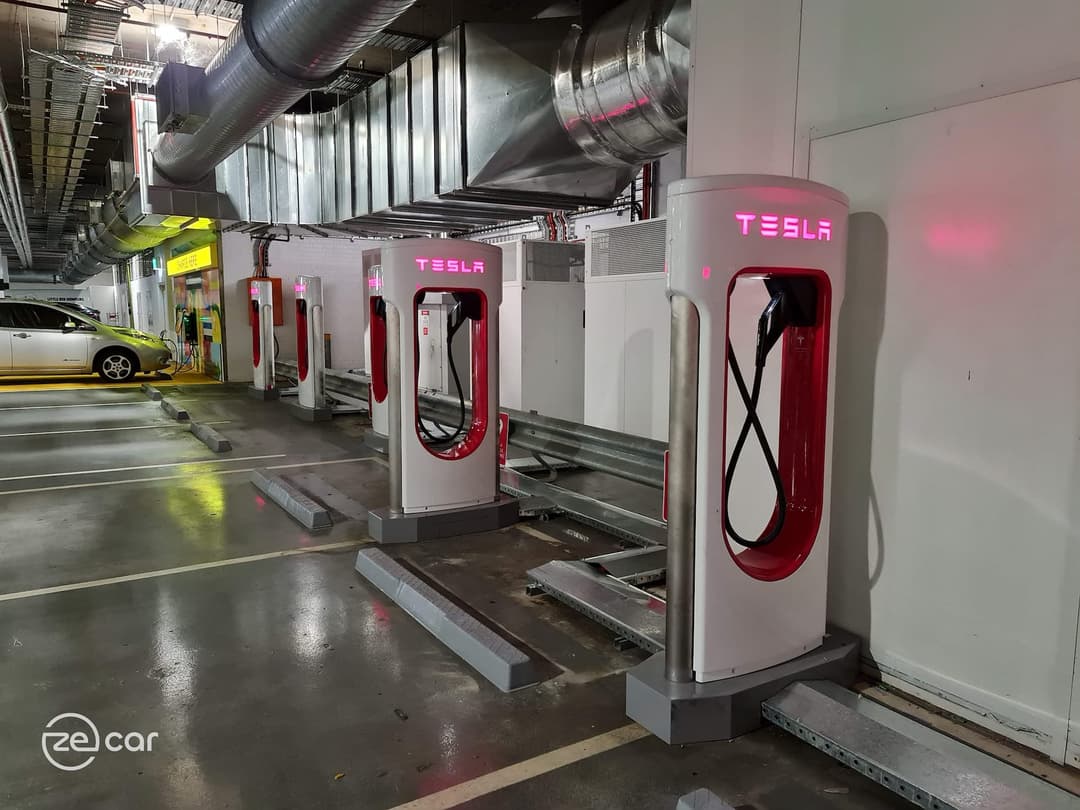
While Tesla did offer free Supercharging for early adopters of their vehicles, this program has since been modified. Most new Tesla owners in Australia will need to pay for Supercharging. Tesla occasionally runs promotions or referral programs that can offer limited free Supercharging credits. Check Tesla's official Australian website for the most up-to-date information.
Below is a guide for free charging for all electric cars, including Tesla.
🛍️Shopping centres and businesses
Several businesses, universities, and shopping centres or markets offer free charging to its customers and visitors. These may include slow AC and fast DC charging points.
Of course, it's courtesy to support the business in exchange. For example, a three-hour shopping trip could provide more than 50 per cent charge on a Tesla Model 3 RWD when connected to a 11kW AC charger.
However, you should consider if deliberately driving there is worth the range consumed (if it's out of your local area or commute) and the likely time needed to queue for the free charger (as it's bound to be popular). The best way to check if there are free electric vehicle charging facilities is:
- Search using the Plugshare app;
- Check the website of the business, university or shopping centre; or
- Search using Google Maps and filter "electric vehicle charging"
🏨Hotels and motels
Hotels, motels and Airbnb hosts are increasingly providing EV destination charging facilities for guests. These can range from a standard powerpoint outlet to a Level 2 charge point capable of 22kW AC power.
If you plan on parking your car overnight, why not charge it at the same time and take advantage of free charging (or for a small fee)? It could save you $20 to $40 for a full charge compared to using public fast chargers. The best way to check if your accommodation provides electric vehicle charging facilities is:
- Search using the Plugshare app;
- Check the website/listing or contact the accommodation provider; or
- Search using Google Maps and filter "electric vehicle charging"
⚡️Jolt charging stations
Every Jolt charging station provides up to 7kWh of free charging per day, with standard rates applying thereafter. This equates to 30 to 40 km of range enough to cover the daily distance of most Australian drivers.
🔋NRMA charging stations
All NRMA fast DC chargers operated by Chargefox in New South Wales with some in Victoria and South Australia are currently free to all EV owners, without any limits. However, the state motoring club will soon make free charging exclusive to members only.
About the author
Stay up to date with the latest EV news
- Get the latest news and update
- New EV model releases
- Get money savings-deal

